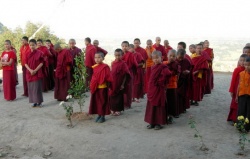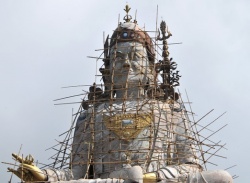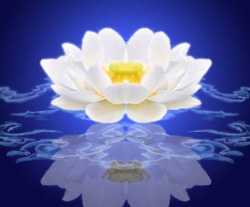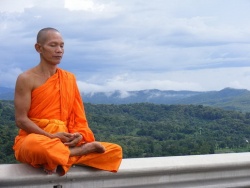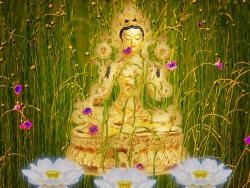Difference between revisions of "Ocean of oath-bound protectors"
(Created page with " There are two sorts of protectors, enlightened protectors and oath bound protectors, who are in their retinue. Ritual offerings are usually mad...") |
|||
| Line 1: | Line 1: | ||
| + | <nomobile>{{DisplayImages|2809|3011|4510|2433|4416|3893}}</nomobile> | ||
| + | There are two sorts of [[protectors]], [[enlightened protectors]] and [[oath bound protectors]], who are in their retinue. | ||
| − | + | [[Ritual]] [[offerings]] are usually made to [[protectors]] around sunset asking for the removal of [[obstacles]] to practice. | |
| + | |||
| + | |||
| + | In general, there are both [[mundane]] and [[supra‐mundane Dharma protectors]] who dispel practitioners' inner and outer [[hindrances]]. | ||
| + | |||
| + | Each of those is also divided into [[father‐lineage]] and [[mother‐lineage]] types. | ||
| + | |||
| + | In regard to [[mundane protectors]], some are actually [[transcendent wisdom]] supra‐mundane [[protectors]] just exhibiting the [[form]] of a [[worldly]] [[deity]], while others are actually [[mundane]] [[deities]], in fact. | ||
| − | [[ | + | Supra‐mundane or [[transcendent wisdom]] [[Protectors]] would include S[[ix Armed Swift Wisdom Mahakala]] who is of a [[nature]] of [[Arya Avalokiteswara]]; the [[five Yab‐Yum Four Faced Mahakalas]] |
| + | who are of a [[nature]] of [[Shri Chakrasamvara]] and the [[four Mothers]]; [[Tent Mahakala]] who is of a [[nature]] of [[Hevajra]]; | ||
| − | + | [[Palden Mag Zor Ma]], who is the [[goddess]] [[Saraswati]] revealing a [[wrathful]] aspect, and so forth. | |
| − | |||
| − | + | A [[protector]] who exhibits a [[worldly]] aspect yet is in fact indivisible from [[Manjusri]] [[Yamantaka]] is this very [[Dharma Protector]], | |
| − | + | Mighty [[Gyalchen Dorje Shugden]]. | |
| − | |||
Then there is the [[protector]] of [[Sukhavati]] who is [[Buddha Amitabha]] in [[nature]], the great [[Dharma Protector Setrab Chen]]; | Then there is the [[protector]] of [[Sukhavati]] who is [[Buddha Amitabha]] in [[nature]], the great [[Dharma Protector Setrab Chen]]; | ||
| Line 24: | Line 32: | ||
| + | Actual [[worldly protectors]] include those such as [[Ode Gung Gyel]], and [[Yarlha Shampo]], who were [[bound]] under oath by many previous [[holy beings]] and committed themselves to protecting the Teachings. | ||
| − | + | There are many, many powerful [[worldly protectors]] such as these. | |
In regard to those who exhibit [[worldly]] aspect though their [[nature]] be actually supra‐mundane, as it says in the [[enlightenment]] [[chapter]] of the [[Uttaratantra]], under {{Wiki|classification}} of types of [[refuge]], | In regard to those who exhibit [[worldly]] aspect though their [[nature]] be actually supra‐mundane, as it says in the [[enlightenment]] [[chapter]] of the [[Uttaratantra]], under {{Wiki|classification}} of types of [[refuge]], | ||
| Line 34: | Line 43: | ||
[[Buddhas]] appear in [[forms]] other than that of actual [[Vajradhara]]. | [[Buddhas]] appear in [[forms]] other than that of actual [[Vajradhara]]. | ||
| − | Accordingly, the | + | Accordingly, the [[wish‐fulfilling jewel]] is not varicolored, yet it transforms into many various colors so that it appears to be colors that it is not. |
Likewise, because of the various families, [[faiths]], and wishes of [[beings]], [[Buddhas]] who have exhausted all faults, sometimes [[emanate]] with [[body]], {{Wiki|speech}}, and [[mind]] that appear as if they have not abandoned all faults. | Likewise, because of the various families, [[faiths]], and wishes of [[beings]], [[Buddhas]] who have exhausted all faults, sometimes [[emanate]] with [[body]], {{Wiki|speech}}, and [[mind]] that appear as if they have not abandoned all faults. | ||
| − | In impure environments, they [[emanate]] displaying ordinary deluded [[worldly forms]], when appearing to [[pure]] [[beings]] they appear as [[transcendent wisdom]] | + | In impure environments, they [[emanate]] displaying ordinary deluded [[worldly forms]], when appearing to [[pure]] [[beings]] they appear as [[transcendent wisdom]] [[supra‐mundane Protectors]], |
| − | and on occasions of [[extreme purity]] they appear in the [[form]] of the non‐dual [[Yuganadha]], the Unified Pair. But there has never been a [[worldly]] or a | + | and on occasions of [[extreme purity]] they appear in the [[form]] of the [[non‐dual]] [[Yuganadha]], the [[Unified Pair]]. |
| + | |||
| + | But there has never been a [[worldly]] or a [[supra‐mundane Dharma protector]] who was [[truly existent]] as such from its [[own]] side. | ||
Furthermore, even those who appear to be enemies who are harming oneself, for someone who is [[meditating]] on the [[spiritual path]], at the common stage of great scope, appear as one’s [[own]] extremely cherished dear child, and at the uncommon first stage, they appear through the force of [[meditation]] as [[gods]] and [[goddesses]]. | Furthermore, even those who appear to be enemies who are harming oneself, for someone who is [[meditating]] on the [[spiritual path]], at the common stage of great scope, appear as one’s [[own]] extremely cherished dear child, and at the uncommon first stage, they appear through the force of [[meditation]] as [[gods]] and [[goddesses]]. | ||
| − | When the special [[bliss]] of [[completion stage]] is generated in the | + | When the special [[bliss]] of [[completion stage]] is generated in the [[mind]], they appear in [[mandalas]] throughout [[space]] in [[wisdom]] [[forms]] and [[pure lands]]. |
| − | [[mind]], they appear in [[mandalas]] throughout [[space]] in [[wisdom]] [[forms]] and [[pure lands]]. | ||
Gradually, when one attains the supreme great [[bliss]], they appear in no [[form]] other than that of the great [[Sambogakaya]] of [[Akanishta]] [[Pure Land]] because their [[appearance]] as enemies and the {{Wiki|conception}} of them as enemies has been severed. | Gradually, when one attains the supreme great [[bliss]], they appear in no [[form]] other than that of the great [[Sambogakaya]] of [[Akanishta]] [[Pure Land]] because their [[appearance]] as enemies and the {{Wiki|conception}} of them as enemies has been severed. | ||
| Line 60: | Line 70: | ||
From: MUSIC DELIGHTING THE OCEAN OF PROTECTORS by [[Kyabje Trijang Dorje Chang]], | From: MUSIC DELIGHTING THE OCEAN OF PROTECTORS by [[Kyabje Trijang Dorje Chang]], | ||
| − | [[Dharma protectors]] ([[chos-skyong]], Skt. [[dharmapala]]) are {{Wiki|male}} or {{Wiki|female}} figures who help ward off interference to our practice | + | [[Dharma protectors]] ([[chos-skyong]], Skt. [[dharmapala]]) are {{Wiki|male}} or {{Wiki|female}} figures who help ward off interference to our practice. |
| + | On the deepest level, they represent our [[blissful awareness of voidness]] in strong energetic [[forms]] - the best [[protection]] against interference. | ||
| − | + | With ourselves as [[Buddha]]-figures, we [[visualize]] certain [[protectors]] in each [[direction]] around or inside our [[mandalas]]. | |
| − | |||
| − | + | In specific [[yidam practices]], we also invite certain other types of [[Dharma protectors]] - such as [[Mahakala]] ([[dGon-po]]) or [[Palden Lhamo]] ([[dPal-ldan lha-mo]], Skt. [[Shridevi]]) - into our [[mandalas]] to make [[offerings]] to them and to give them instructions to assist us in our [[enlightening]] [[activities]]. | |
| + | Many of this last type of [[protectors]] were originally powerful [[spirits]], either clutching [[ghosts]] ([[yi-dags]], [[hungry ghost]]) or [[divine beings]] ([[lha]], [[gods]]) of [[non-Buddhist]] [[traditions]]. | ||
| + | Some were harmful and others were simply guardians of mountain tops or local regions. Great [[masters]] of the {{Wiki|past}} have tamed them and made them [[swear]] oaths to {{Wiki|protect}} the [[Buddhist Dharma]] and its practitioners. | ||
| − | As Buddha-figures, we are like [[masters]] and the [[Dharma protectors]] we deploy are like our fierce guard [[dogs]]. | + | As [[Buddha]]-figures, we are like [[masters]] and the [[Dharma protectors]] we deploy are like our fierce guard [[dogs]]. |
Unless we have the strength to control them and to feed them regularly, they may turn against us. | Unless we have the strength to control them and to feed them regularly, they may turn against us. | ||
| Line 81: | Line 93: | ||
| − | [[Dharma protector]] practices include elaborate "fulfill and restore" [[rituals]] ([[bskang-gso]]), in which we, as Buddha-figures, remind the [[protectors]] to fulfill the oaths that they promised and restore our close bonds with them by making special [[offerings]]. | + | [[Dharma protector]] practices include elaborate "fulfill and restore" [[rituals]] ([[bskang-gso]]), in which we, as [[Buddha]]-figures, remind the [[protectors]] to fulfill the oaths that they promised and restore our close bonds with them by making special [[offerings]]. |
Another common [[ritual]] is the golden libation ([[gser-skyems]]), in which we offer [[alcohol]] or black tea to the [[protectors]], but without [[tasting]] it ourselves. | Another common [[ritual]] is the golden libation ([[gser-skyems]]), in which we offer [[alcohol]] or black tea to the [[protectors]], but without [[tasting]] it ourselves. | ||
| Line 89: | Line 101: | ||
In the [[West]], [[people]] informally call all these practices "[[protector pujas]]". | In the [[West]], [[people]] informally call all these practices "[[protector pujas]]". | ||
| − | To create an even closer bond with a [[Dharma protector]], we may also do a [[protector | + | To create an even closer bond with a [[Dharma protector]], we may also do a [[protector retreat]] in which we recite the associated [[mantras]] hundreds of thousands of times and offer a concluding [[fire puja]]. |
| − | As Buddha-figures, we may invoke certain [[Dharma protectors]], such as [[Palden Lhamo]], to assist in making prognostications (mo, [[thugs-dam]]) with dice or [[rosary beads]]. Completion of a [[protector | + | As [[Buddha]]-figures, we may invoke certain [[Dharma protectors]], such as [[Palden Lhamo]], to assist in making prognostications (mo, [[thugs-dam]]) with dice or [[rosary beads]]. Completion of a [[protector retreat]] is required for such practice. |
Certain [[Dharma protectors]] in certain [[Tibetan Buddhist traditions]] may also serve as [[yidams]], such as [[Mahakala]] in the [[Kagyu tradition]]. | Certain [[Dharma protectors]] in certain [[Tibetan Buddhist traditions]] may also serve as [[yidams]], such as [[Mahakala]] in the [[Kagyu tradition]]. | ||
| Line 98: | Line 110: | ||
| − | In general, there are both [[mundane]] and | + | In general, there are both [[mundane]] and [[supra‐mundane Dharma protectors]] who dispel practitioners' inner and outer [[hindrances]]. Each of those is also divided into [[father‐lineage]] and [[mother‐lineage]] types. |
| − | In regard to [[mundane | + | In regard to [[mundane protectors]], some are actually [[transcendent wisdom]] [[supra‐mundane protectors]] just exhibiting the [[form]] of a [[worldly]] [[deity]], while others are actually [[mundane]] [[deities]], in fact. |
| − | Supra‐mundane or [[transcendent wisdom | + | Supra‐mundane or [[transcendent wisdom Protectors]] would include [[Six Armed Swift Wisdom]] Mahakala]] who is of a [[nature]] of [[Arya Avalokiteswara]]; |
the five Yab‐Yum [[Four Faced Mahakalas]] who are of a [[nature]] of [[Shri Chakrasamvara]] and the four Mothers; | the five Yab‐Yum [[Four Faced Mahakalas]] who are of a [[nature]] of [[Shri Chakrasamvara]] and the four Mothers; | ||
| Line 117: | Line 129: | ||
in fact, the [[Buddhas of the five families]]; The [[Protector Dorje Legpa]], who exhibits [[worldly]] aspect although he is [[Vairochana]] in [[nature]], and so on. | in fact, the [[Buddhas of the five families]]; The [[Protector Dorje Legpa]], who exhibits [[worldly]] aspect although he is [[Vairochana]] in [[nature]], and so on. | ||
| + | {{R}} | ||
| + | [http://newbuddhist.com/discussion/4580/what-are-dharma-protectors] | ||
| + | [[Category:Dharmapalas]] | ||
Revision as of 02:53, 7 October 2015
There are two sorts of protectors, enlightened protectors and oath bound protectors, who are in their retinue.
Ritual offerings are usually made to protectors around sunset asking for the removal of obstacles to practice.
In general, there are both mundane and supra‐mundane Dharma protectors who dispel practitioners' inner and outer hindrances.
Each of those is also divided into father‐lineage and mother‐lineage types.
In regard to mundane protectors, some are actually transcendent wisdom supra‐mundane protectors just exhibiting the form of a worldly deity, while others are actually mundane deities, in fact.
Supra‐mundane or transcendent wisdom Protectors would include Six Armed Swift Wisdom Mahakala who is of a nature of Arya Avalokiteswara; the five Yab‐Yum Four Faced Mahakalas
who are of a nature of Shri Chakrasamvara and the four Mothers; Tent Mahakala who is of a nature of Hevajra;
Palden Mag Zor Ma, who is the goddess Saraswati revealing a wrathful aspect, and so forth.
A protector who exhibits a worldly aspect yet is in fact indivisible from Manjusri Yamantaka is this very Dharma Protector,
Mighty Gyalchen Dorje Shugden.
Then there is the protector of Sukhavati who is Buddha Amitabha in nature, the great Dharma Protector Setrab Chen;
Gyalpo Ku Nga, the Five Kings, who show a worldly aspect although they are, in fact, the Buddhas of the five families;
The Protector Dorje Legpa, who exhibits worldly aspect although he is Vairochana in nature, and so on.
Actual worldly protectors include those such as Ode Gung Gyel, and Yarlha Shampo, who were bound under oath by many previous holy beings and committed themselves to protecting the Teachings.
There are many, many powerful worldly protectors such as these.
In regard to those who exhibit worldly aspect though their nature be actually supra‐mundane, as it says in the enlightenment chapter of the Uttaratantra, under classification of types of refuge,
Just as the jewel shines with With various colors not its own, Likewise, due to varying conditions of beings, Buddhas appear in forms other than that of actual Vajradhara.
Accordingly, the wish‐fulfilling jewel is not varicolored, yet it transforms into many various colors so that it appears to be colors that it is not.
Likewise, because of the various families, faiths, and wishes of beings, Buddhas who have exhausted all faults, sometimes emanate with body, speech, and mind that appear as if they have not abandoned all faults.
In impure environments, they emanate displaying ordinary deluded worldly forms, when appearing to pure beings they appear as transcendent wisdom supra‐mundane Protectors,
and on occasions of extreme purity they appear in the form of the non‐dual Yuganadha, the Unified Pair.
But there has never been a worldly or a supra‐mundane Dharma protector who was truly existent as such from its own side.
Furthermore, even those who appear to be enemies who are harming oneself, for someone who is meditating on the spiritual path, at the common stage of great scope, appear as one’s own extremely cherished dear child, and at the uncommon first stage, they appear through the force of meditation as gods and goddesses.
When the special bliss of completion stage is generated in the mind, they appear in mandalas throughout space in wisdom forms and pure lands.
Gradually, when one attains the supreme great bliss, they appear in no form other than that of the great Sambogakaya of Akanishta Pure Land because their appearance as enemies and the conception of them as enemies has been severed.
For example, just as enemies we don't even want to see or hear about can later become friends with whom we are inseparable, all are projections of nothing but our own mind.
As Venerable Milarepa said, This realization that what appears is aspects of mind: When not realized, that is the ignorance That is the basis of all karma and delusion. If realized, it is ones own transcendent awareness And all positive qualities increase.
From: MUSIC DELIGHTING THE OCEAN OF PROTECTORS by Kyabje Trijang Dorje Chang,
Dharma protectors (chos-skyong, Skt. dharmapala) are male or female figures who help ward off interference to our practice.
On the deepest level, they represent our blissful awareness of voidness in strong energetic forms - the best protection against interference.
With ourselves as Buddha-figures, we visualize certain protectors in each direction around or inside our mandalas.
In specific yidam practices, we also invite certain other types of Dharma protectors - such as Mahakala (dGon-po) or Palden Lhamo (dPal-ldan lha-mo, Skt. Shridevi) - into our mandalas to make offerings to them and to give them instructions to assist us in our enlightening activities.
Many of this last type of protectors were originally powerful spirits, either clutching ghosts (yi-dags, hungry ghost) or divine beings (lha, gods) of non-Buddhist traditions.
Some were harmful and others were simply guardians of mountain tops or local regions. Great masters of the past have tamed them and made them swear oaths to protect the Buddhist Dharma and its practitioners.
As Buddha-figures, we are like masters and the Dharma protectors we deploy are like our fierce guard dogs.
Unless we have the strength to control them and to feed them regularly, they may turn against us.
Thus, the Dharma protector practices in which we invite specific ones into our mandalas are extremely advanced, not for beginners.
Engagement in their practices normally requires receiving specific subsequent permissions (jenangs) for them.
Dharma protector practices include elaborate "fulfill and restore" rituals (bskang-gso), in which we, as Buddha-figures, remind the protectors to fulfill the oaths that they promised and restore our close bonds with them by making special offerings.
Another common ritual is the golden libation (gser-skyems), in which we offer alcohol or black tea to the protectors, but without tasting it ourselves.
We may also simply invite the protectors into our mandalas to make offerings, especially of tormas, and to make requests (gsol-'debs).
In the West, people informally call all these practices "protector pujas".
To create an even closer bond with a Dharma protector, we may also do a protector retreat in which we recite the associated mantras hundreds of thousands of times and offer a concluding fire puja.
As Buddha-figures, we may invoke certain Dharma protectors, such as Palden Lhamo, to assist in making prognostications (mo, thugs-dam) with dice or rosary beads. Completion of a protector retreat is required for such practice.
Certain Dharma protectors in certain Tibetan Buddhist traditions may also serve as yidams, such as Mahakala in the Kagyu tradition.
Mostly, however, we do not visualize ourselves as Dharma protectors.
In general, there are both mundane and supra‐mundane Dharma protectors who dispel practitioners' inner and outer hindrances. Each of those is also divided into father‐lineage and mother‐lineage types.
In regard to mundane protectors, some are actually transcendent wisdom supra‐mundane protectors just exhibiting the form of a worldly deity, while others are actually mundane deities, in fact.
Supra‐mundane or transcendent wisdom Protectors would include Six Armed Swift Wisdom Mahakala]] who is of a nature of Arya Avalokiteswara;
the five Yab‐Yum Four Faced Mahakalas who are of a nature of Shri Chakrasamvara and the four Mothers;
Tent Mahakala who is of a nature of Hevajra; Palden Mag Zor Ma, who is the goddess Saraswati revealing a wrathful aspect, and so forth.
A protector who exhibits a worldly aspect yet is in fact indivisible from Manjusri Yamantaka is this very Dharma Protector, Mighty Gyalchen Dorje Shugden.
Then there is the protector of Sukhavati who is Buddha Amitabha in nature, the great Dharma Protector Setrab Chen;
Gyalpo Ku Nga, the Five Kings, who show a worldly aspect although they are,
in fact, the Buddhas of the five families; The Protector Dorje Legpa, who exhibits worldly aspect although he is Vairochana in nature, and so on.
